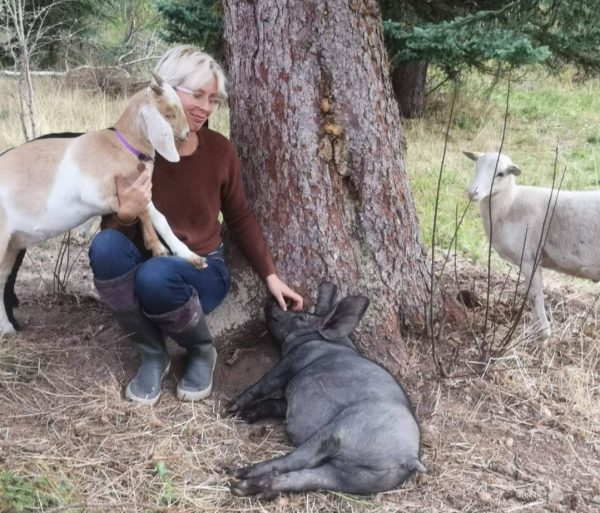Thompson Rivers University (TRU) student Kelly Davison spent her childhood feeling “less than.” Living in foster care for several years, she says her foster mother did her best, but it wasn’t enough to counter the exclusion she felt within the school system and greater community. Facing hardship, adversity and discrimination, Davison’s dreams were quashed before they even entered her mind.
“I never imagined myself going to university. I didn’t even see that as being a possibility until I was 29 years old. I didn’t even consider for a moment that that door was open to me,” says Davison, who spent years working entry-level jobs, believing that was the best she could do. With the birth of her daughter in 2010, Davison’s world slowly began to open.
“We spent a lot of time at the public library and I realized I could do what they were doing,” Davison says. She researched programs and registered for online courses in community library services, eventually getting a position at her local library, where she worked for over eight years.

Regenerative farming techniques play a big part in the development of the Davison family farm.
When the world locked down in 2020 and uncertainty loomed, Davison and her husband Brian decided the timing was right to change course and create a more sustainable future for themselves and their children. After exploring options throughout the province, they discovered the Cariboo.
“The Cariboo was the first place where not only could we afford farming based on price per acre, but where it felt like home,” she says.
Brian had a background in agriculture and a good idea of what ranching meant to him, but Kelly had a different vision.
“I didn’t know what I was doing,” she says. “I knew that I had all the passion for it, but I was asking him a lot of questions and the things that I wanted to farm were not the things he is familiar with.”
Radio program sparks desire to know more
Davison’s lightbulb moment came one day as she was driving through the countryside listening to a discussion on CBC about sustainable, regenerative agriculture. She immediately knew she had to learn more and called a friend to help her in her quest.
“I said to her, ‘This is what I need. I need to learn about regenerative or sustainable farming. I need to be able to do it from our home because we have young kids and I want to get started right away,’” Davison says.
Her friend called her back 10 minutes later to tell her about the Applied Sustainable Ranching (ASUR) program at TRU in Williams Lake.
Davison contacted Gillian Watt, ASUR director, to say she wanted to register and hoped to start right away. Unfortunately, the semester was underway, but Watt encouraged her to join the program in the next semester. Davison began as soon as she could.
Davison recently entered her final semester in ASUR, a program that gives students practical experience on farms or ranches while they acquire a foundation in business and enterprise management and learn how to practise regenerative agriculture.
Within the first few weeks of the program, Davison recalls Watt encouraging students to apply for student awards. At that point, she didn’t feel worthy and didn’t heed Watt’s advice — a decision she later regretted.
“I should have just applied and trusted that the donors would pick whoever was the most deserving,” she says.
The following semester, not only did she apply, but she also encouraged all her classmates to submit applications as well.
Asking for help is empowering
The applications took her about three hours to complete and for much of that time her daughter, now 13, sat alongside. She explained to her that while there’s no guarantee you’ll win, it’s important to apply for any awards you are eligible for, even when the process feels uncomfortable.
“I can’t give her everything that I want to give her, but to be able to give her that role model of gratitude and vulnerability in supportive and safe spaces, I think is really important. She’s the one who motivated me to go to school and do better with my life because I wanted to do better for her,” Davison says.
In October 2022, shortly after submitting her applications, Davison learned her elder sister Tammy was missing. One week later, Tammy’s body was found and her death ruled a suicide. Davison was shattered, but with the support of Watt and the rest of the department, she completed the semester and discovered that pouring herself into schoolwork provided a positive outlet to focus her energy, in spite of her grief.
Her hard work paid off. In early December Davison learned she was the recipient of several awards, including two memorial awards. She describes the moment as moving and bittersweet.
“It was so meaningful to me that these people who had also lost someone chose to put these bursaries forward to help move someone else’s future forward,” she says. “It also made me feel connected to my sister. After her death, I wanted to put as much positivity into the world as I could and embrace the parts of her that I found moving and that I really missed. Being chosen made me feel like someone was helping me do that.”
Davison received the TRU Grit Entrance Award, Chan Wai Chiu Memorial Bursary and Howard Beharrell Memorial Bursary. She began her final semester of the ranching program in September and says the business and farming knowledge she has learned through the program is invaluable.
Through passion and sweat equity, the Davison family farm is slowing taking shape. This summer, they finished the acreage’s fencing, put up barns and produced a market garden. They have sheep and goats and endless plans to progress — one day at a time, knowing they have the support of their community behind them.

